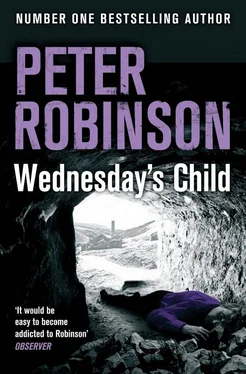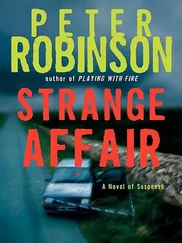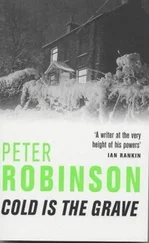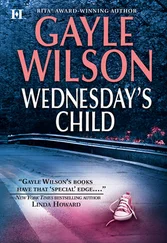Peter Robinson - Wednesday's Child
Здесь есть возможность читать онлайн «Peter Robinson - Wednesday's Child» весь текст электронной книги совершенно бесплатно (целиком полную версию без сокращений). В некоторых случаях можно слушать аудио, скачать через торрент в формате fb2 и присутствует краткое содержание. Год выпуска: 2006, ISBN: 2006, Издательство: Penguin Canada, Жанр: Полицейский детектив, на английском языке. Описание произведения, (предисловие) а так же отзывы посетителей доступны на портале библиотеки ЛибКат.
- Название:Wednesday's Child
- Автор:
- Издательство:Penguin Canada
- Жанр:
- Год:2006
- ISBN:978-0-14-305219-7
- Рейтинг книги:5 / 5. Голосов: 1
-
Избранное:Добавить в избранное
- Отзывы:
-
Ваша оценка:
- 100
- 1
- 2
- 3
- 4
- 5
Wednesday's Child: краткое содержание, описание и аннотация
Предлагаем к чтению аннотацию, описание, краткое содержание или предисловие (зависит от того, что написал сам автор книги «Wednesday's Child»). Если вы не нашли необходимую информацию о книге — напишите в комментариях, мы постараемся отыскать её.
Wednesday's Child — читать онлайн бесплатно полную книгу (весь текст) целиком
Ниже представлен текст книги, разбитый по страницам. Система сохранения места последней прочитанной страницы, позволяет с удобством читать онлайн бесплатно книгу «Wednesday's Child», без необходимости каждый раз заново искать на чём Вы остановились. Поставьте закладку, и сможете в любой момент перейти на страницу, на которой закончили чтение.
Интервал:
Закладка:
Gristhorpe set his tea and sandwich beside the books on the small round table, within easy reach, and settled back with a sigh into his chair. The only sounds that broke the silence were the wind soughing through the elms and the ticking of the grandfather clock in the hall.
To retire or not to retire, that was the question that kept him from immediately picking up The Way of All Flesh . Over the past few years he had delegated most of the investigative work to his team and spent his time on administrative and co-ordinating duties. He had absolute trust in Alan Banks, his protégé, and both DS Richmond and the recently appointed DC Gay were coming along well. Should he move aside and clear the space for Banks’s promotion? Certainly Alan showed an enthusiasm for work and learning that reminded Gristhorpe of himself as a young lad. Both lacked formal education beyond the local grammar school, but neither let it hold him back. Banks was a good detective, despite his anti-authoritarian tendencies, occasional rashness and a loathing for the politics that were now becoming so much a part of the job. But Gristhorpe admired him for that. He, himself, hated police politics. Banks, though twenty years younger, was a real copper, a man who had come from the street. He also had imagination and curiosity, two qualities that Gristhorpe thought essential.
And what would he do with his time if he did retire? There was the dry-stone wall, of course, but that was hardly a full-time occupation. Nor was reading, especially with the way his eyesight had been declining of late. He was at an age when every odd ache or pain brought a little more fear than it had before, when colds lingered and settled on the chest. But he was no hypochondriac. The Gristhorpes were robust, always had been.
He would like to travel, he decided, to revisit Venice, Florence, Paris, Madrid, and go somewhere he had never been before — the Far East, perhaps, or Russia. But travel cost money, and a policeman’s pension wouldn’t stretch that far. Gristhorpe sighed and picked up Samuel Butler. He didn’t have to make his decision tonight; best wait for a while.
He had hardly got through the first paragraph when the phone rang. Marking the page with a leather strip and putting the book aside, he got up and walked into the hall. It was Sergeant Rowe from the station. He had received a message from Susan Gay about a child gone missing from the East Side Estate. Could the superintendent come in as soon as possible? Gristhorpe could get few more details over the phone, except that the child had been taken by a man and a woman pretending to be social workers and that she had been gone over a day. As he listened to Sergeant Rowe deliver the message in his flat, emotionless voice, Gristhorpe felt a shiver go up his spine.
Grimly, he put on his tweed jacket and went outside to the car. It was completely dark now, and the lights of Lyndgarth twinkled below on the daleside. Gristhorpe drove through the village, past the squat St Mary’s, and onto the main Eastvale road. It was a journey he had made hundreds of times, and he drove automatically, without even having to think about the dips and turns. Normally, even in the dark, he would glance at certain landmarks — the lights of the old Lister house way up on the opposite slopes of the valley; the six trees bent over by the wind on the drumlin to the west — but this time he was too distracted to notice the landscape.
As he drove towards the lights of Eastvale, he remembered that long Saturday in October, 1965, when he and dozens of other young policemen had stood in the drizzle and the biting wind 1,600 feet up the Pennines listening to their orders. There they all stood, in anoraks and wellington boots, shivering in the late autumn cold on the top of Saddleworth Moor, complaining about the Saturday afternoon football they were missing. It was eerie enough just being up there in the banshee wind, the rain and inky light, with those outcrops of rocks like decayed teeth on the skyline. All day they had searched, dragging their feet through the mud and peat, from 9:30 a.m. until well after three o’clock. The rain had stopped by then, and the weather was a little warmer, the moor shrouded in a slight mist.
Suddenly Gristhorpe had heard the shout from a searcher in the distance: a young lad, he remembered, just out of training college, who had taken a break to answer a call of nature. Those nearby, Gristhorpe included, hurried towards him, and watched in horror as Detective Sergeant Eckersley came and scraped away the clinging peat from a child’s arm bone. A little more digging revealed a head. Eckersley stopped at that. He sent for the scene-of-crime officers, and soon they all arrived, out of nowhere, the Assistant Chief Constable, police surgeons, photographers, Joe Mounsey, the lot.
They put up canvas screens and everyone but the brass and the SOCOs had to stand back. As the doctor scraped off the dirt and the flash camera popped, the whole gruesome discovery finally lay revealed. Gristhorpe caught only a glimpse of the body through a gap in the canvas, but it was enough.
They had been looking for a boy called John Kilbride, but what they had found was the near-skeletal body of a girl lying on her side with her right arm raised above her head. Close to her feet, her clothes lay bundled — a blue coat, a pink cardigan, a red-and-green tartan skirt. Instead of John Kilbride, they had found the body of Lesley Ann Downey, aged ten, another victim of the couple who came to be called the “Moors Murderers,” Ian Brady and Myra Hindley.
Somehow, that day stood engraved in Gristhorpe’s memory more than any other day in his life. Months, even years, might go by and he wouldn’t even think of that October day in 1965, but when something like this happened, there it was, every bit as real and as horrifying as if he were back there on the moor seeing that arm sticking up through the quagmire as if it were waving or pointing.
He had thought of it only once in the past few years, and that was when a sixteen-year-old girl had gone missing from one of the Swainsdale villages. And now two people, a man and a woman — just as Brady and Hindley had been — had walked bold as brass into a house on the East Side Estate and abducted a seven-year-old girl.
As Gristhorpe drove down narrow North Market Street past the Town Hall, the lit window displays of the tourist shops and the community centre, he gripped the wheel so hard his knuckles turned white as he once again heard the girl’s voice in his head from the tape Brady and Hindley recorded before they murdered her: Lesley Ann whimpering and begging for her mummy and daddy to help her; Brady telling her to put something in her mouth and saying he wants to photograph her. And that damn music, that damn music, “The Little Drummer Boy.” Gristhorpe had never been able to listen comfortably to any music since then without hearing the girl screaming and begging for mercy in his head, and he let everyone believe he was tone deaf to avoid awkward explanations.
He turned his car into the parking area at the back of the station, an old Tudor-fronted building, the front of which faced Eastvale’s market square, and sat for a few moments to calm himself down and rid himself of the memory. And before he went inside, he delivered a silent prayer — not without some embarrassment, for he wasn’t a religious man — that there should be nothing, nothing to compare between this affair and the Moors Murders. No time for thoughts of retirement now.
III
As Banks walked down the street towards The Barleycorn, he glanced at the rows of identical red brick houses. There was no doubt about it, the East Side Estate was a disaster. True, some tenants had bought the houses when the Thatcher government sold them off, and many had added a white fence here, a lick of paint there, or even a dormer window. But it was a shabby area, with junk-littered lawns, children’s tricycles left in the street, and mangy dogs running free, fouling the pavements, barking and snapping at passers-by.
Читать дальшеИнтервал:
Закладка:
Похожие книги на «Wednesday's Child»
Представляем Вашему вниманию похожие книги на «Wednesday's Child» списком для выбора. Мы отобрали схожую по названию и смыслу литературу в надежде предоставить читателям больше вариантов отыскать новые, интересные, ещё непрочитанные произведения.
Обсуждение, отзывы о книге «Wednesday's Child» и просто собственные мнения читателей. Оставьте ваши комментарии, напишите, что Вы думаете о произведении, его смысле или главных героях. Укажите что конкретно понравилось, а что нет, и почему Вы так считаете.












